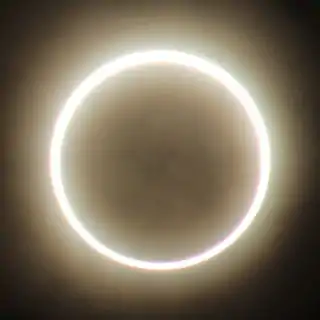Solar eclipse of January 25, 1982
A partial solar eclipse occurred on January 25, 1982. A solar eclipse occurs when the Moon passes between Earth and the Sun, thereby totally or partly obscuring the image of the Sun for a viewer on Earth. A partial solar eclipse occurs in the polar regions of the Earth when the center of the Moon's shadow misses the Earth.
| Solar eclipse of January 25, 1982 | |
|---|---|
 Map | |
| Type of eclipse | |
| Nature | Partial |
| Gamma | -1.2311 |
| Magnitude | 0.5663 |
| Maximum eclipse | |
| Coordinates | 69.3°S 91.7°W |
| Times (UTC) | |
| Greatest eclipse | 4:42:53 |
| References | |
| Saros | 150 (15 of 71) |
| Catalog # (SE5000) | 9468 |
Related eclipses
Solar eclipses of 1979–1982
This eclipse is a member of a semester series. An eclipse in a semester series of solar eclipses repeats approximately every 177 days and 4 hours (a semester) at alternating nodes of the Moon's orbit.[1] There were 8 solar eclipses between February 26, 1979 and July 20, 1982. Were there: February 26, 1979 (total solar eclipse, 0.8 days after perigee, 103.9%, 0.89811 gamma, saros 120), August 22, 1979 (small annular solar eclipse, 0.6 days before apogee, 93.3%, -0.96319 gamma, saros 125), February 16, 1980 (total solar eclipse, 1 day before perigee, 104.3%, 0.22244 gamma, saros 130), August 10, 1980 (large annular solar eclipse, 5 days before apogee, 97.3%, -0.19154 gamma, saros 135), February 4, 1981 (large annular solar eclipse, 4 days before perigee, 99.4%, -0.48375 gamma, saros 140), July 31, 1981 (total solar eclipse, 3.8 days after perigee, 102.6%, 0.57917 gamma, saros 145), January 25, 1982 (moderate partial solar eclipse, 4.7 days after apogee, 56.6%, -1.23110 gamma, saros 150) and July 20, 1982 (small partial solar eclipse, 0.9 days after perigee, 46.4%, 1.28859 gamma, saros 155).
| Solar eclipse series sets from 1979–1982 | ||||||
|---|---|---|---|---|---|---|
| Descending node | Ascending node | |||||
| Saros | Map | Gamma | Saros | Map | Gamma | |
| 120 | 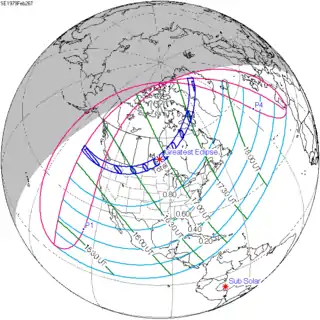 1979 February 26 Total | 0.89811 | 125 | 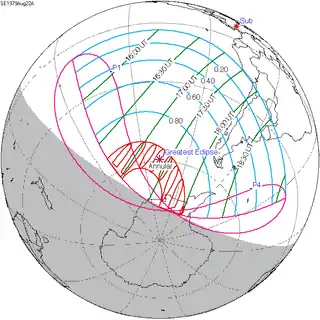 1979 August 22 Annular | -0.96319 | |
| 130 |  1980 February 16 Total | 0.22244 | 135 |  1980 August 10 Annular | -0.19154 | |
| 140 | 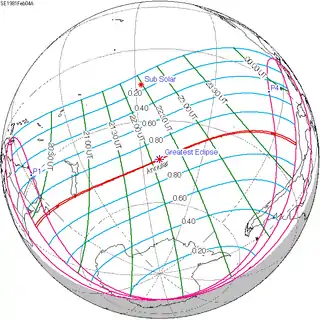 1981 February 4 Annular | -0.48375 | 145 | 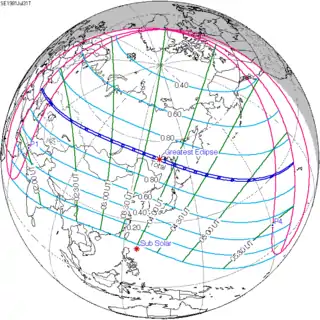 1981 July 31 Total | 0.57917 | |
| 150 |  1982 January 25 Partial | -1.23110 | 155 |  1982 July 20 Partial | 1.28859 | |
| Partial solar eclipses on June 21, 1982 and December 15, 1982 occur in the next lunar year eclipse set. | ||||||
Metonic series
The metonic series repeats eclipses every 19 years (6939.69 days), lasting about 5 cycles. Eclipses occur in nearly the same calendar date. In addition, the octon subseries repeats 1/5 of that or every 3.8 years (1387.94 days).
| 22 eclipse events, progressing from north to south between April 8, 1902 and August 31, 1989: | ||||
|---|---|---|---|---|
| April 7–8 | January 24–25 | November 12 | August 31-September 1 | June 19–20 |
| 108 | 114 | 116 | ||
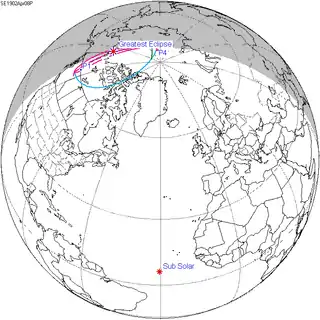 April 8, 1902 |
 August 31, 1913 |
 June 19, 1917 | ||
| 118 | 120 | 122 | 124 | 126 |
 April 8, 1921 |
 January 24, 1925 |
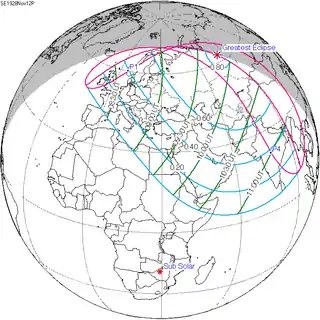 November 12, 1928 |
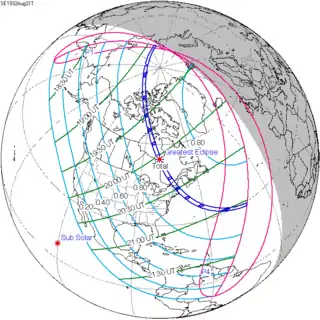 August 31, 1932 |
 June 19, 1936 |
| 128 | 130 | 132 | 134 | 136 |
 April 7, 1940 |
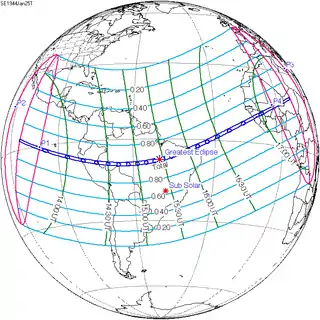 January 25, 1944 |
 November 12, 1947 |
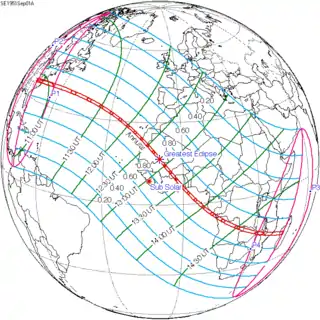 September 1, 1951 |
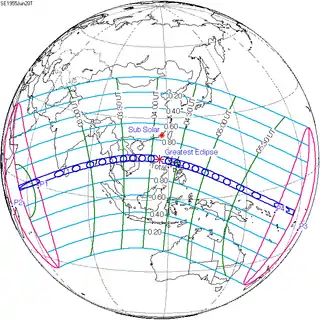 June 20, 1955 |
| 138 | 140 | 142 | 144 | 146 |
 April 8, 1959 |
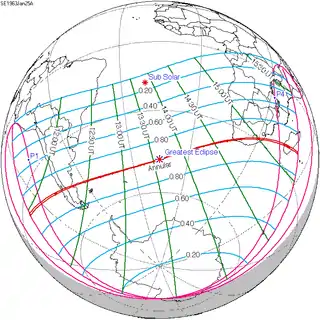 January 25, 1963 |
 November 12, 1966 |
 August 31, 1970 |
 June 20, 1974 |
| 148 | 150 | 152 | 154 | |
 April 7, 1978 |
 January 25, 1982 |
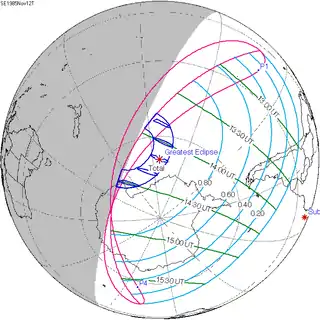 November 12, 1985 |
 August 31, 1989 | |
References
- van Gent, R.H. "Solar- and Lunar-Eclipse Predictions from Antiquity to the Present". A Catalogue of Eclipse Cycles. Utrecht University. Retrieved 6 October 2018.
External links
- Earth visibility chart and eclipse statistics Eclipse Predictions by Fred Espenak, NASA/GSFC
.jpg.webp)
